
Foreigners wishing to open a Thai account face additional hurdles from Monday February 17. Even those who require a savings or current account to apply for a Destination Thailand Visa (with 500,000 baht) or for a non-immigrant “O” retirement permit (with 800,000 baht) are likely to find difficulties. Well-connected and popular agencies, such as Tik Tok based in Jomtien, have advised on social media that they will be unable to assist with opening bank accounts for foreign customers until further notice.
The Thai government, via the Bank of Thailand, has officially launched a renewed attack on mule accounts in Thailand aiming to curb financial fraud and money laundering. Freezing a staggering 1.8 million bank accounts suspected of being mule accounts, the Anti-Money laundering Office says that 2,500 account holders have actually been arrested during the past year. Police enquiries are now centering on telecommunications companies, digital platforms, e-wallet service providers as well as actual consumers.
The timing of the announcement likely reflects the Thai government’s allied campaign against scam call centers, especially those based in Myanmar and Cambodia. Thai electricity supplies have been cut in some areas with limited success. Meanwhile, attempts continue to ensure that Thai mobile banking accounts match with the SIM card holder’s name. That has already led to various difficulties, for example for foreigners using their wife’s name or for registered corporate accounts registered under the managing director’s personal phone number.
Government officials are reluctant to give a timescale for the latest crackdown on foreigners trying to open bank accounts in Thailand. Tellers at Thai banks told Pattaya Mail that the problem might last for several weeks whilst investigations continue into fake websites, messaging apps, social media and individuals suspected of involvement in banking criminality. Some bank staff say that the biggest single issue involves Asian tourists opening bank accounts to launder cash into capital-flight cryptocurrency which is hard to track.
There is currently no formal ban on banks opening new accounts, but they commonly refuse on the grounds that “the applicant’s intentions are unclear” a catch-all phrase which penalizes (for example) all tourist visa holders with permission to stay less than one year. Banks can also suspend accounts if they suspect money laundering, fraud, terrorist financing or drugs and human trafficking proceeds.
According to Siam Development, the overall situation highlights how regulatory solutions in Thailand often create more problems than they solve. The fight against mule accounts is necessary, but a more precise strategy is required: one that targets the actual criminals before freezing bank accounts indiscriminately. For the short term at least, businesses and foreign nationals must brace for further banking difficulties in an already challenging environment. In other words, Keep Calm and Carry On. As best you can.










